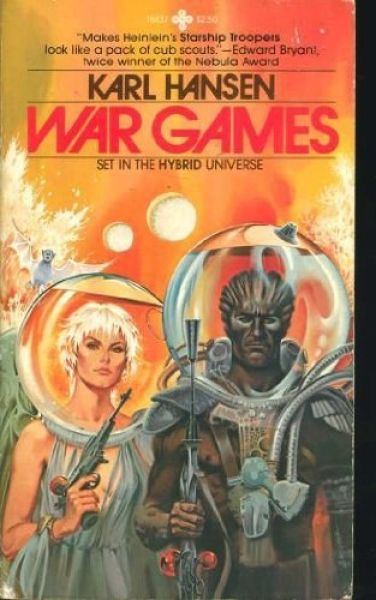Lost Voices 2: War Games by Karl Hansen
War Games (Hybrid, volume 1)
By Karl Hansen

20 Apr, 2000
0 comments
Karl Hansen
Playboy Paperback Science Fiction [1981]
288 pages
Synopsis: The setting is the solar system sometime in the future. Biotechnology allows the adaptation of life, including human life, to harsh and exotic environments. Accordingly, Titan has been the target of ecopoeisis and have a rich and varied native ecosystem, including tweaked humans, nicknamed ‘elves’ by the Terran humans. The elves are oppressed by the decadent Terran Empire and the guerrilla war between elves and humans forms the background of the story.
Mark Detrs is the son of Terran aristocracy. Abused sexually, physically and mentally, his attempts to run away fail until he acquires a timestone, which allows him to see the future and sometimes change it. Eventually he murders his parents to prevent them from killing him. His subsequent life of crime is ended when, after he sees his death in the timestone, the stone [along with his hand] is destroyed. To escape his fate, he chooses to join the military and become a combat hybrid, a biologically engineered cyborg whose probable lifespan is measured in month. He is somewhat disappointed when he sees his first combrid corpse and realises his vision is still compatible with his current appearance. The only method he can think of to avoid his death is to find another timestone and use it to save himself. Luckily, he knows there is another one somewhere on Titan and the name of the person who knows where it is.
Detrs spends six months as a combrid on Titan, killing elves and arranging the deaths of his comrades as he sees fit. His path crosses that of Grychn, his childhood sweetheart in whom he confided everything, including the existence of the timestone. She is on the run from the Empire, having joined the cause of the anti-Imperial groups. He decides that he can not afford to have her arrested, where she might reveal his secret but his attempt to kill her fails and she is captured.
Eventually, he is wounded badly enough to require extensive repair. Although his wounds are easily repairable by the standards of the day, he is allowed to retire five and a half years early due to orders from the power that be in the Terran Empire.
He searches for the sailor who knows where the other timestone is. This requires playing in the quasi-telepathic games run in the mind casinos, a past time with a high fatality rate. His handler, a doctor, gets him addicted to better control him. He comes across Grychn in the mindgames, Grychn having apparently escaped from the intelligence branch of the TE. After he finds the sailor and learns the location of the timestone, Detrs and Grychn escape the mindgames together. They are pursued by Kramr, an intelligence branch chameleon, who finally catches up with them on Iapetus. Detrs confronts the timestone, which attempts to control his actions through induced insanity: Grychn saves Detrs mind by breaking the timestone’s spell and Detrs saves both of them by killing Kramr.
Although Detrs now realises that he and Grychn were both pawns of Kramr on Titan and that Grychn betrayed him to Kramr both knowingly [if unwillingly] and unknowingly, he is no longer the type of person who casually abandons or kills his friends and they remain lovers.
This is unfortunately a flawed work: Much of the technology in the books is pure and obvious technobabble, dwelt on at far too great a length. The Terran Empire has crystals which can do anything the setting requires. There is an astonishing about of tosh about entropy and an utterly garbled version of the laws of thermodynamics of the sort which would make physicists’ heads explode if I repeated here. Hansen overuses various phrases [For example the colour blue as a descriptive colour, or the phrase ‘hydrocarbon’] and ‘alpha-whips’ make their victims actually glow, as may certain drug overdoses.
Despite that and despite the various perverse rapes which litter the book, the book does have strengths. The protagonist actually changes and matures over the course of the story, from a complete sociopath to a sociopath with the faint glimmerings of a conscience, which, given that aristocracy of the Terran Empire to which Detrs belongs seem to uniformly be decadent and cruel immortals, and that most of his life is spent inadvertently serving a object designed to increase entropy and death as rapidly as possible, is an impressive accomplishment. The setting, involving advanced biotechnological ecopoeisis on potentially life bearing worlds is interesting, as is the fact that the Terran Empire did not simply try to remake Earth on other worlds but created ecosystems entirely unlike the Earth’s [MMV but I find the faux-Earths in much of SF dull and unimaginative and works which don’t fall into this trap are that much more interesting to me[1]]. I didn’t enjoy this novel nearly as much as when I was 20 but I have spent much worse hours.
Karl Hansen wrote this book and another, _War Games_, also set in the Hybrid Universe. He wrote several short stories as well. His career, measured from his first story in _2076: The American Tri-Centennial_ to _War Games_, spanned about nine years. Although Clute comments in the entry in the _Science Fiction Encyclopedia_ that more entries in the Hybrid Universe story are expected, none have to my knowledge appeared thus far.
Next: Casey Agonistes , Richard McKenna.
1: Which is the main reason I finished Barton and Copabianco’s Alpha Centauri . Come think of it, Barton reminds me a little of what Hansen might be if Hansen were not apparently a scientific illiterate [With some really nifty ideas, of course]
